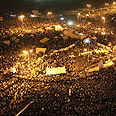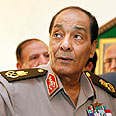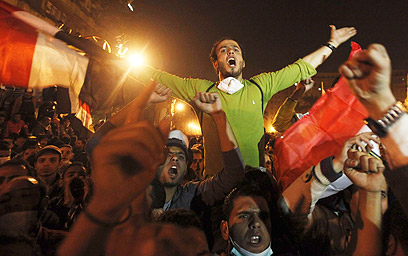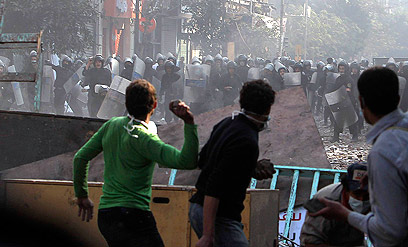


Three more people died in Cairo on Wednesday, a medic said, as violence which has killed dozens raged into a fifth day despite promises by Egypt's military ruler to speed up the transition to democracy.
Clashes broke out in Mohammed Mahmud street, just off Cairo's iconic Tahrir Square, where thousands of protesters rallied again on Wednesday to demand an immediate end to military rule.
Riot police erected barricades on Mohammed Mahmud street, shooting tear gas and birdshot, which ricocheted off concrete buildings, sending dust and chips of cement into tear gas-filled air, according to an AFP reporter.
Shadi al-Naggar, a doctor at the Omar Makram field hospital, said three people had died in the latest violence, which pits security forces against demonstrators throwing stones and petrol bombs.
"It looked like live bullets, but I didn't get a chance to examine (them) before they were taken away to the hospitals," he told AFP.
"One of them had his skull crushed."
A 10-year-old child was among the latest casualties, hit in the head by a live bullet, according to Father Fawzi Abdel Wahib at a church turned into a field hospital, although it was unclear if the boy had died.
"He was taken to the Qasr al-Aini hospital. He probably won't make it alive to the hospital," said Abdel Wahib.
The health ministry said in a statement issued Wednesday by the state news agency MENA that a total of 32 people had died since the clashes began on Saturday. It gave a toll on Wednesday of two dead.
The numbers still haven't reached those of the previous protests, which, nine months ago led to the fall of former President Hosni Mubarak – but the protestors are more determined to finally achieve a handover of power from the military to the people rather than accept cosmetic changes.
For now, the masses have no intention of leaving Tahrir Square in spite of Supreme Council of the Armed Forces (SCAF) Chief, Field Marshal Mohamed Hussein Tantawi's speech.
Related stories:
- Egypt: Tantawi vows to transfer power
Report: Military Council eyes ElBaradei as new PM
Op-ed: Beware Egyptian fascism
The Egyptian health ministry stated that close to 40 people have been killed in the riots. Al-Jazeera network reported that one Egyptian was killed by security forces fire in Alexandria, in addition to the three who were killed in Cairo.

Back in Tahrir Square (Photo: Reuters)
According to Egyptian news website al-Youm al-Saba'a, security forces sought to establish positions in central Cairo on Wednesday, not far from Tahrir Square. The protestors, who saw the move as an attempt to take over the square, hurled rocks at the forces who then responded with tear gas.
"We're sick and tired of all of the Military Council's tricks," said Rafiq, an accountant who bears the physical evidence of the recent violence. A bandage covers a wound he received on Tuesday morning from security forces stationed at the Interior Ministry. The forces fired at protestors who had been trying to take over the building that most represents the old regime to the Egyptian masses, since Saturday.
"They said good morning and then fired at us," Rafiq said, adding "What's happening here is unbelievable: We, with low incomes, pay taxes so that the security forces will be equipped with weapons to defend us and instead they fire at us with those weapons.
"We want to get rid of these monsters. The security forces need to serve the people, not the corrupt that steal from the state treasury and put the money in their own pockets."
We stand in the heart of Tahrir Square that has filled with more and more protestors. They came to express their disgust with the continued reign of the Military Council's emergency government and what they see as "foul" political tricks meant to leave the reigns of power in the hands of the military rather than fulfill the promises for and aspirations of democracy.
A week before the elections for the Egyptian Parliament, the opposition parties from all sides of the political arena called on the Egyptian people to head back to the streets to hold "million man demonstrations" against the military regime. The response was impressive, but has yet to break the record of the "January Revolution."
'Tantawi like Mubarak'
"We are a nation with a great deal of patience," screamed one young demonstrator, trying to be heard among the crowds flooding the square. Groups of young protestors run around the square carrying Egyptian flags and shouting slogans: "We're back in the square," "Tantawi you pig, the courts await you," "Gaddafi, Gaddafi, in Egypt too."
The short pre-recorded message from the Military Council Chief was a far cry from what the protestors expected and demanded. In fact, most of them did not have high expectations from his speech. "The speech changes nothing," Ali a language student noted. "Tantawi is like Mubarak; he wants to stay in his chair and not move."
Tantawi's tactic was to act insulted by the protestors. As a representative of "the glorious army, defender of the people," he rejected outright all accusations against the Military Council that claimed it sought to remain in power and prefers the Islamist parties to the secular parties.
"The SCAF only cares about the interest of the nation. It is not interested in who wins the elections or who will assume the presidency. This is the will of the people."
Not seeking to rule
Tantawi pledged to "continue placing the interests of the Egyptian people first," adding that the military would willingly transfer power to a civilian government by July 1, 2012.
Egypt's military ruler also floated the idea of a referendum on an immediate power transfer: "The Military Council does not seek to rule. We are more than willing to transfer power if a people's referendum demands it," he said.
"The Armed Forces will not take the place of the people's government," Tantawi vowed. "We do not intend to cling to power. Our goal has always been to reinstate security to Egypt.
In reaction to Tantawi's speech, the leader of the Freedom and Justice Party, a party affiliated with the Muslim Brotherhood said that his party would closely follow "Tantawi's commitment to transfer the reigns of power to the representatives of the civilian people through parliamentary and presidential elections by the end of the first half of 2012."
"At that point the military must return to its bases and fulfill its duties in defending the homeland," said Dr Mohamed Saad Katatni.
- Receive Ynetnews updates
directly to your desktop
















